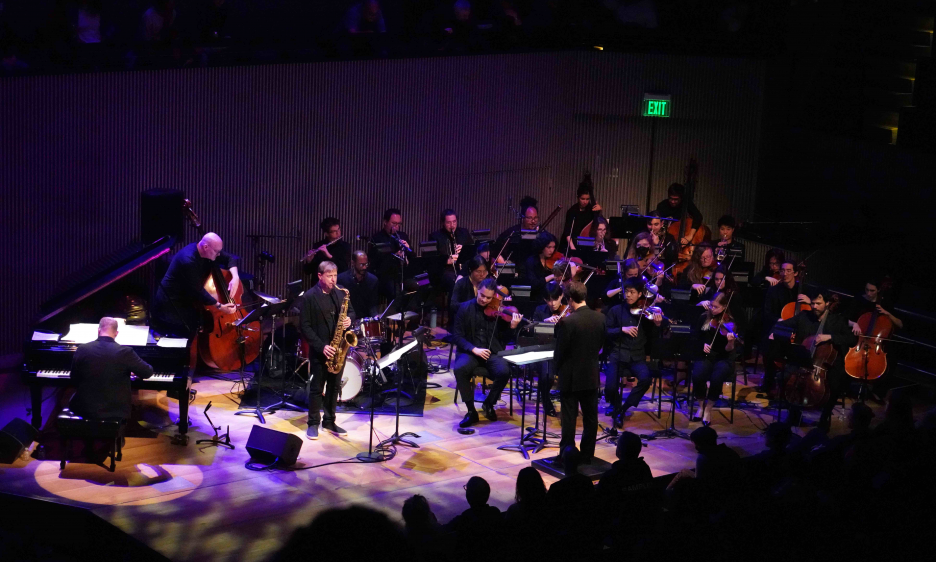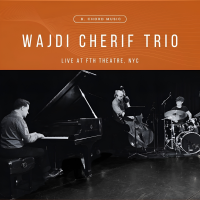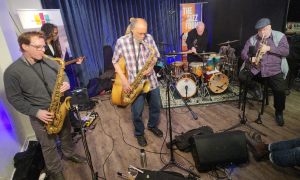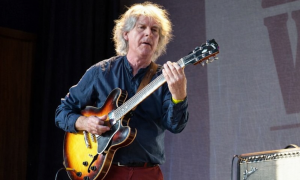Home » Jazz Articles » Live Review » Chris Potter's Generations at SFJAZZ
Chris Potter's Generations at SFJAZZ

Courtesy Rick Swig
...Layers of sounds constantly realign as tonalities and instrumentation change.
SFJAZZ Center
San Francisco, CA
April 23, 2023
Veteran saxophonist and composer Chris Potter, onstage at the beginning of the final performance of a four-night presentation in San Francisco of "Generations," his remarkable new suite, informed the audience that "There are eight movements, and each of them is named for a passage from Ecclesiastes 3:'There is a season, and a time for each purpose.' The first movement is "To Be Born."
The widely celebrated Potter, now musical director of the SFJAZZ Collective and in his second season as the institution's resident artistic director, describes "Generations" as a "meditation on the connections between people through time, and on the relationships between events of the past, present and future. Potter carefully edited and orchestrated his saxophone improvisations with the intent of maintaining room for improvisation. He fluidly integrated the orchestra and quartet, while maintaining his saxophone as, as Potter puts it, a "unifying constant, representing continuity through change." This all works amazingly well; layers of sounds constantly realign as tonalities and instrumentation change.
To the right of the 22-piece orchestra were four of the most formidable musicians in contemporary jazz. The orchestra's adept young conductor led off—bringing in the orchestra's strings (violin, viola and cello)—commence the hour-and-a-half suite. Pianist Craig Taborn played piano rapid-fire, while the perpetually grinning Brian Blade held down on drums. Potter added another blistering, impassioned solo, switching to percussive bursts of sound to conclude.
For "To Embrace," whose tones ranged from exuberant to meditative, the orchestra led off before Potter and Taborn engaged in a lyrical duet. Taborn introduced "To Weep" with a meditative and lyrical piano solo. Scott Colley's bass provided the backdrop for Potter's piercing solo. A cello solo set the mood then trumpet and flute came in as the tune ended.
A fierce, cacophonous wall of sound—initiated by Potter, and buttressed by the quartet and orchestra—led off "A Time to Gather Stones." As Potter offered a glistening solo, Colley frantically plucked behind him and Taborn played the strings inside the piano. Potter initiated a call and response with the orchestra; then the quartet came back in soft and smoothly before segueing to a passionate piano accompanied by Colley's bass before the orchestra's return . Potter, bending his knees to blow, led the entire ensemble at a brisk, almost militaristic pace, to bring it to a halt.
"To Mend followed," its bowed and plucked violins added subtlety; Potter and Taborn soloed masterfully. Stage lights dimmed and turned red for the next movement as "A Time for Peace" began. Colley soloed dexterously before the clarinets and flute came in. The full orchestra came in with gorgeous melodies before Taborn soloed again. All stood silent as Potter soloed fluently then the conductor leaped in the air, dramatically flourishing his wand, to end the suite.
The ensemble exited to raucous applause. The quartet alone returned for the stately and calming "All by All," one of the best compositions on Potter's Song for Anyone (Sunnyside, 2007). A meditative end to an uplifting evening.
Tags
Live Review
Harry S. Pariser
United States
California
san francisco
Chris Potter
Craig Taborn
Brian Blade
Scott Colley
PREVIOUS / NEXT
Chris Potter Concerts
Mar
27
Fri
Support All About Jazz
 All About Jazz has been a pillar of jazz since 1995, championing it as an art form and, more importantly, supporting the musicians who make it. Our enduring commitment has made "AAJ" one of the most culturally important websites of its kind, read by hundreds of thousands of fans, musicians and industry figures every month.
All About Jazz has been a pillar of jazz since 1995, championing it as an art form and, more importantly, supporting the musicians who make it. Our enduring commitment has made "AAJ" one of the most culturally important websites of its kind, read by hundreds of thousands of fans, musicians and industry figures every month.



























